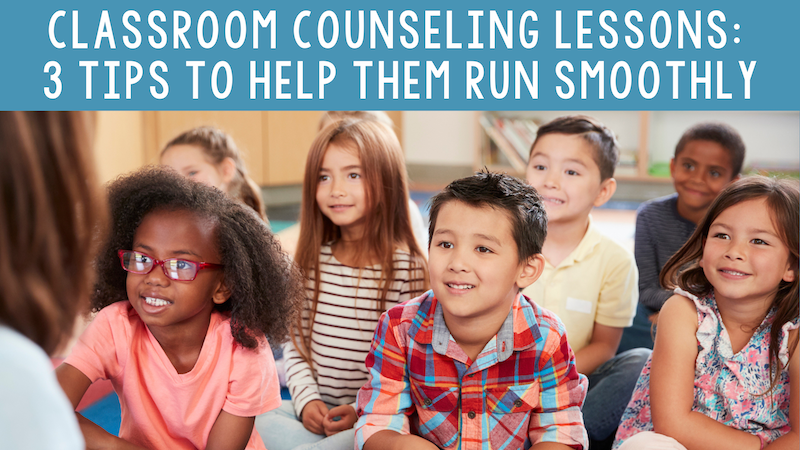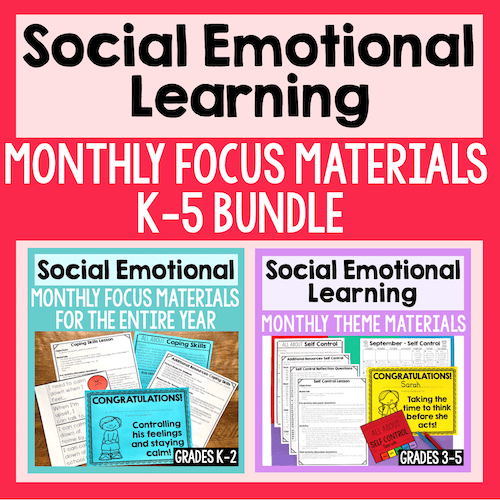Classroom Counseling Lessons: 3 Tips To Help Them Run Smoothly
Confession time… classroom counseling lessons have always felt a bit intimidating to me. After all, I'm not a teacher by trade and I haven't had training in classroom management, differentiated instruction, etc. Plus, these lessons usually aren’t daily, which can make it hard to get into a rhythm with students.
Thankfully, there are some things you can do to make this part of your job feel less scary. Below, you’ll find some tips that will help you feel more confident and prepared as you plan and implement classroom counseling lessons.
Classroom Counseling Tip #1: Make A Plan
Planning can be hard sometimes because it seems like it takes extra time. BUT, having a general plan of where you want to go with your classroom counseling lessons, and which topics you’re hoping to cover, is helpful for so many reasons. Without a plan, I find myself spending more time scrambling last minute, and struggling to get through the things that I want to do.
Personally, I have loved doing a monthly theme for classroom lessons. It assures me that I'm not going to forget about teaching something important and helps me (and my students) feel more focused.
Try this: Pick 5-10 topics you want to cover in your classroom counseling lessons this year. These topics can come from needs assessments, conversations with your school staff, or the ASCA standards. You can see my favorite topics here. Then, write down the months of the school year, and under each month, leave a space for the number of classroom counseling lessons you’ll do for each grade.
You can choose one of the topics from your list to teach about each month. If you are doing multiple lessons a month, you can break down each topic into smaller concepts. For example, if you are doing 2 lessons on friendship, you may want to do one lesson on making friends, and one lesson on being a good friend.
Once you have a general outline, you can look at the materials you already have and love, and decide where they fit. Any empty spaces will help you see what activities and materials you still need to look for.
Here are a few posts on why I love having a monthly theme and the calendar I follow. You can also grab a set of free planning sheets here.
Classroom Counseling Tip #2: Set A Routine
Kids thrive on predictability and order. Since classroom counseling lessons are usually something that's outside of the students' daily routines, it's even more important that you take steps to provide consistency in your lessons so the kids always know what to expect.
One way to do this is to always open and close your lessons with the same type of activity. Whether it’s a simple check-in, or a quick mindfulness exercise, doing something consistent can help your students feel less anxious.
You can choose a certain routine, or flow of events, for all of your classroom counseling lessons. Although the specific activities may change depending on what you are teaching about, having a general order can ensure that students know what to expect next.
Here's a sample routine you could follow:
Opening breathing exercise
Topic intro/Discussion questions
Activity
Follow up discussion questions
Closing breathing exercise
Once you decide on a routine that works for you and your students, it can be helpful to write it down so that students can see it as a visual reminder of what will be happening. You can also download these free visual schedule cards.
There is a lot of flexibility as to how you want to structure your lessons, but having a general rhythm to them can help kids know what to expect and can make it easier to plan.
Classroom Counseling Tip #3: Think About Classroom Management
Classroom counseling lessons are out of the ordinary. Most likely, you don't see the students every day. This can make it difficult to set the expectations and procedures that will help things run smoothly. However, thinking about what this will look like ahead of time will help you to be proactive instead of reactive.
Your classroom management strategies may change as you settle into a routine and get to know your students better. However, thinking about the general principles that you want to prioritize can be a great place to start.
Some questions you can ask yourself as you think about this are:
Will I use my own procedures/expectations, or what has already been established by the classroom teacher?
How will I enforce expectations when they are met and not met?
What do I want the culture of the group to be, and how will I foster that?
For more tips on classroom management as a counselor, check out this post.
Whether you are just starting out, or have been doing classroom counseling lessons for decades, I hope that these tips will help you feel more confident. If you are looking for more tips and ideas, sign up below to get them delivered straight to your inbox!








